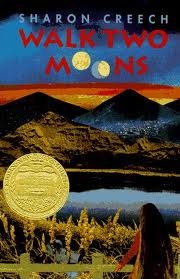Walk Two Moons
![]()
by Sharon Creech. (Harpercollins, 1994. ISBN 0060233346. Hardcover, Library Binding, Paperback, Cassette, Spanish.) Novel. 280 pages. Grades 4 and up.
![]()
Review

This Newbery Winning book brought mixed reactions. Rebecca liked it while Carol was not overly impressed. None the less, many love this book and so here is a summary and some ideas for using it in the classroom.
Salamanca's mother has left without explanation and not returned. Now 13 year old Sal is traveling across the country with her grandparents following the route her mother took. Along the way her kind and fun-loving grandparents ask her to tell them a story. She shares a long tale about herself and her best friend whose mother has also left her family. Throughout the book the cross-country trip and the story Sal tells are interwoven. There is comedy in the grandparents' eccentricity and poignancy in the story Sal tells to her attentive grandparents.
We get well-developed characters, humor and plot twists. You'll find a lot here about Sal's relationship with her friend, her father, and her grandparents. Her relationship with her mother is complex and Sal's refusal to accept the reality of her mother's disappearance creates affective tension throughout the book. You'll also find mystery and intrigue in Sal's quest for her mother and the mysterious notes leading to her friend's mother.
Discussion Starters
- At the beginning of the book there is a quote:
"Don't judge a man until you've walked two moons in his moccasins."
Reflect on this quote, what are some possible meanings of this quote? What situations might it apply to? When do people tend to judge others? Is it ever helpful? - What do you think of the scene (beginning on page 199 of the hardcover edition) where Mr. Birkway reads students' journals aloud? Do you think it's ever okay to read someone's journal? If you found a friend's journal would you read it?
- Why do you think Sal talks as if she doesn't know what really happened to her mother for most of the story?
- Why does Sal's friend Phoebe think that Mrs. Cadaver is a murderer?
- The author repeatedly uses the phrase "might as well try to catch a fish in the air." What does it mean? What are some other expressions that have similar meanings?
- Why do you think the author chose to make the setting of this book a cross-country car trip?
- Why do you think the author has Sal drive the car for the climactic scene?
Activities
- Web the main characters of the story. How are they interconnected? What things do some of them have in common? How are they different? Which ones are unconventional? Calm? Frightened?
- Sal has a close relationship with her grandparents. What are some of the good things that can come from spending time with grandparents? Write a story about something you have done with your grandparents or another adult other than a parent.
- Map out the places Sal travels on her trip from Euclid, Ohio to Lewiston, Idaho. Find photos of some of the sites and landscapes. Are there things along the way that you would like to see that they don't visit?
- This story and the above quote deal with various perspectives on the same situations. What things can you do to get a sense of someone else's life? Choose people whose moccasins you think it might be interesting to walk in. Write, discuss, and chart what their life might be like. Dig deeper and see if there are aspects of their life that might appear one way at first but actually be different. If you can find someone in the situation interview him or her about how they see their life.
- Take one situation, such as the closing of the school for one week due to burst pipes. Chart how different people might feel about the situation. Include people such as students, parents, teachers, janitors, and school committee members.
- Gram has a stroke near the end of the book. What is a stroke? What is it like for people who survive a stroke?
- This book explores a lot about death and dying. What are some of your beliefs about death and dying? Look through some nonfiction books about death and grieving and how we as a culture deal with this part of life. Collect research on Mexico's Day of the Dead and how their customs may differ from your own. Are there parts of their rituals that you think are healthier than your own culture's? Are their parts of your own cultures that you think are better?
- Sal's great-great grandmother was a Seneca Indian and there are references to the Native American stories her mother used to tell. See Native Americans and Children's Literature.
Related Areas of Carol Hurst's Children's Literature Site
- Related titles:
- Death, Dying and Grief through Kids' Books:
Death, Dying and Grief as Classroom Subject or Theme, Grades Preschool-Ninth: An Annotated Booklist of Some of Our Favorite Children's Books, Some with Links to More Material for Teaching This Topic. - Heartlight
- A Long Way to Chicago
- Death, Dying and Grief through Kids' Books:
- Related Topics:
Related Areas on Other Web Sites

- Sharon Creech's Web Site:
http://www.SharonCreech.com - HarperCollins Publishers: A Guide to Teaching Sharon Creech's Walk Two Moons.
http://www.harperchildrens.com/schoolhouse/TeachersGuides/creech.htm - San Diego County Office of Education: Teacher CyberGuide for Walk Two Moons.
http://www.sdcoe.k12.ca.us/score/walk/walktg.htm - The Literary Link: Study Questions for Walk Two Moons.
http://theliterarylink.com/childsty.html#Walk%20Two%20Moons - ACHUKA Children's Books UK: Sharon Creech - featuring an interview with the author.
http://www.achuka.co.uk/scsg.htm - Educational Paperback Association: Sharon Creech - autobiographical essay.
http://www.edupaperback.org/authorbios/Creechsh.html
You can purchase this book at Amazon.com Bookstore

Walk Two Moons
Advertisement:
Advertisement:
Advertisement:

